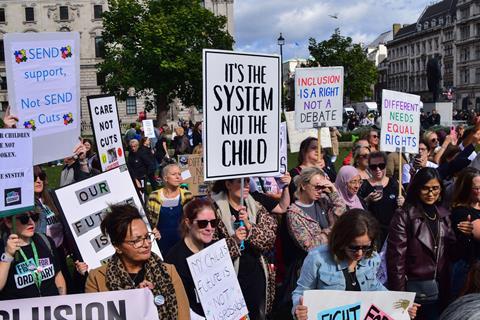
Education minister Georgia Gould MP (pictured) has only been in post since 6 September. But this has been long enough to develop a distinct verbal tic around children and young people’s special educational needs. As minister of state (minister for school standards), Gould was on the front bench for the Commons Westminster Hall debate that followed the success of a petition asking ‘the government to commit to maintaining the existing law, so that vulnerable children with SEND can access education and achieve their potential’.
‘It was such a powerful discussion,’ Gould said, replying to the debate, ‘partly because so much work has gone on to set up listening exercises in constituencies and hear voices around the country.’ She said the chair of the Education Committee, Helen Hayes MP, ‘spoke powerfully’ about its interrogation of SEND for its report, published after the debate.
Another MP, Jen Craft, ‘hosted a really powerful roundtable and drop-in’. The minister ‘met so many parents in my own borough and many others who told me the problems with the system, which we have heard about really powerfully today’.
There was just time to thank MP Adam Dance, who ‘spoke so powerfully about his personal journey’.
Families are forced into adversarial battles for basic entitlements, while educators and professionals operate within systems that are under-resourced and overwhelmed. The evidence is clear: the current model is unsustainable, inequitable, and failing to deliver the outcomes our children deserve.
Power plays

The designation ‘powerful’ was part of an apparent taxonomy urged on Labour MPs by the Department for Education (DfE) over what it hoped would be a summer of public engagement by MPs with constituents. The brief was to make sure families felt heard, to get out the line that schools are not underfunded, and to assuage concerns that the government intended to remove legal rights set out in the Children and Families Act 2014, which replaced ‘statements of special educational needs’ with education, health and care plans (EHCPs).
Holding such meetings and roundtables over the summer was key because an education white paper has been promised this autumn, and resistance to reforms that would remove legal rights, including limiting access to the SEND tribunal, has been growing. Concern has been fuelled by DfE’s stated intention to reform the SEND system, accompanied by, at best, ill-defined assurances on children’s legal rights.
When questioned by the Education Committee, Gould’s predecessor Catherine McKinnell MP was unable to promise that the framework of legal rights and entitlements that provide families with a vital roadmap of what should be happening will be retained, or state that there will be a means of enforcing it when it does not.
‘We’re not looking to change existing provision that is working [emphasis added] for children,’ she said. ‘But obviously that’s not a 100% guarantee of continuity.’
The Local Government Association (LGA) and the County Councils Network have spent years lobbying to weaken or remove their members’ legal obligations to children with SEND. Local authorities’ record at the tribunal, where they lose over 96% of cases they fight, is poor, and both organisations blame SEND commitments for placing councils’ financial stability in jeopardy.
McKinnell went in the reshuffle. Also on the move over the summer were civil servants, including the DfE’s director and a deputy director of SEND. But some government advisers are still in place, kept on at the change of government last July.
Two stand out for their declared views. Tom Bennett (right), a DfE ‘attendance and behaviour ambassador’ is one. His focus on ‘behaviour and attendance’ has been criticised as supporting a view that autism is over-diagnosed and over-accommodated, and expectations on pupil behaviour are too low, leading to a rise in recourse to EHCPs. ‘Homes and families have the biggest impact,’ he told TES.
Another is Dame Christine Lenehan (pictured, below right) who thinks the role of EHCPs should be ‘narrowed’, and who earlier this year publicly confirmed that a proposal that only children at special schools would have an EHCP is ‘the conversation we’re in the middle of’.
Such a conversation happens in an important context – a clear desire by the DfE to see more children with SEND educated in mainstream schools. Which would be uncontroversial if schools were guaranteed the resources and expertise to do the job, backed by accountability where they fail.
A tale of two reports
When Gould rose to praise all things ‘powerful’, two reports were imminent. First, ‘Disabled Children’s Social Care’ from the Law Commission. The commission rowed back on key positions it had outlined in a previous consultation response to side with a local authority weltanschauung.
Earlier draft proposals for consultation by the commission set out the changes it was minded to recommend to ministers. The centrepiece was a new legal framework, a single assessment duty and the introduction of national eligibility criteria for access to social care services for disabled children.
It had concluded – and this is generally welcomed by charities that support children and families – that there is too much focus on safeguarding disabled children at the expense of meeting their needs for social care support such as after-school activities or holiday provision. Also uncontested is the assertion that social care practitioners who assess the needs of disabled children often lack expertise in the child’s disability, or indeed disability in general. It said local eligibility criteria for accessing services are too high. Further, the needs of parents, carers and siblings are overlooked. Different teams, departments and organisations regularly fail to work effectively with each other to provide the support individual children need.
And now? The commission says that ‘in deference to the strong views expressed by local authority stakeholders prior to the consultation that clarifying the law would increase the burden on local authorities’, ( and while it still backs a statutory duty to assess children), it has recommended a higher threshold than the current law on assessing the social care needs of disabled children.
To be delayed, from the commission’s point of view, is the idea of ‘national eligibility criteria’ that would standardise rights because ‘they might be undeliverable in practice without sufficient funding’. It noted a threat by local authorities that they might start charging for ‘social care’ if rights are clarified.
But SEND is a topsy-turvy world right now. One puts a question to the Ministry of Justice and DfE replies; an education white paper is announced by the Treasury; the Law Commission backs expediency over law reform; and the Commons Education Committee focuses on legal rights. The latter is what happened in the committee’s SEND report, which was also published last week.

Education Committee
In contrast to the Law Commission’s proposals, the Education Committee’s report, ‘Solving the SEND crisis’, is bolder on children’s rights, and has an urgency untempered by local government lobbying.
‘The reality for many children and young people with SEND is one of unmet needs, delayed support, and fractured services,’ the committee said. ‘Families are forced into adversarial battles for basic entitlements, while educators and professionals operate within systems that are under-resourced and overwhelmed. The evidence is clear: the current model is unsustainable, inequitable, and failing to deliver the outcomes our children deserve… Change is not optional – it is urgent and essential. The Department for Education must act decisively, working across government and with all stakeholders including children with SEND and their families to deliver a SEND system that is inclusive, fair, and fit for the future.’
The committee wants to see significant improvements in mainstream schools to allow educational needs to be met.
Of crucial interest is the committee’s conviction that legal rights should remain intact: ‘The SEND reforms must not be based on any withdrawal of statutory entitlements for children and young people with SEND. The [DfE] must instead set out plans for reform which increase accountability across the whole of the SEND system, so that many more parents and carers can be confident that their children’s needs will be met regardless of whether they have a diagnosis or EHC plan.’
White paper
Earlier this year, the preparation of a SEND white paper was briefed, reported, and then denied by DfE. Then, in her June spending review, chancellor Rachel Reeves announced an education white paper was indeed being prepared. This, she said, will include ‘details on supporting local authorities as the government transitions to a reformed system as part of the upcoming local government funding reform consultation’.
There was an accompanying announcement of £740m to ‘encourage councils to create more specialist places in mainstream schools’.
Who, though, might have the biggest influence on the government’s white paper? Local authority groups persuaded the Law Commission to alter its position, so it is worth noting what groups such as the LGA are pressing for.
A report by consultancy Isos Partnership, commissioned by the LGA, envisages a new pathway to support which will see all children enter the school system through a single, mainstream route. It is envisioned a failure to provide support that children need would see families appealing to the school’s governors, and then the ombudsman (not the tribunal). The report acknowledges that special schools will exist, but provides no clear route for children to enrol.
Elsewhere, right-wing thinktank Policy Exchange released a report titled ‘Out Of Control’ at the end of August. The report ‘identifies how poor incentives have driven overdiagnosis of mental ill health and neurodivergence in young people, stretching key public services to breaking point. The SEND, child disability and mental health systems are failing to distinguish between legitimate and exaggerated claims for support… The report calls for the current SEND system to be radically overhauled, with EHCPs only for students in special schools, and councils and professionals empowered to manage budgets and resources’.
Jeremy Hunt MP, former health secretary, wrote the foreword. It is not DfE’s work, but there are certainly many interest groups on manoeuvres. Reform UK-controlled councils and the party’s leadership are on the record as seeking to cut SEND budgets.
Lenehan’s confirmation that a drastic reduction in EHCPs is being discussed is also relevant. More than half of EHCPs are for children who attend mainstream schools.
It is notable that while Gould stuck to her department’s taxonomy on SEND, the 39 Labour MPs who spoke in the parliamentary debate that followed the legal rights petition did not (34 Liberal Democrat MPs and four Conservatives spoke).
MP after MP talked of a lack of trust, lack of accountability, and of the painful, devastating experiences of families and their children with special educational needs and disabilities.
Collision course
Accountability – and enforceability – go to the heart of concerns around possible reform to legal rights, or the right to seek redress using the law.
This week, The i Paper reported that the prime minister is on a ‘collision course with MPs who fear SEND reforms mean “austerity”’. It added: ‘Labour members say they are gearing up to vote against any changes that “take away services” or “reduce support, financial or otherwise” for pupils with SEND… [and] have told The i Paper that their red lines would also include children losing their legal rights to funding and provision – currently set out through individual education health and care plans.’
Writing in the Guardian, also this week, journalist John Harris, who is involved in the group Save Our Children’s Rights, also predicts ‘rebellion’.
The SEND tribunal now has a significant backlog. It can take a year for a case to reach it, which is a long time in the education of any child (and other processes will have preceded arrival at the tribunal, or the ombudsman). Many are unrepresented, but those specialist lawyers who are instructed by families tell the Gazette that it is frustrating to see the same points repeatedly lost by local authorities.
Institutional learning in local authorities is weak. In part, that must be because there are no adverse consequence for mistakes made in law. Losing a case is not a trigger for reflection on how other cases might be handled by a council.
The DfE’s ministers and officials acknowledge – indeed are keen to reference – the fact that the adversarial aspect of securing SEND provision is bruising – traumatising even. But the department does not criticise local authorities, and on current evidence, it is not prioritising accountability and will not back the full maintenance of existing rights.
Unless the white paper sets out a satisfactory position on accountability and legal rights, it is hard to see how a policy could command the confidence of families or carers grappling with the system with one eye firmly on the risks attached to its reform.




































No comments yet